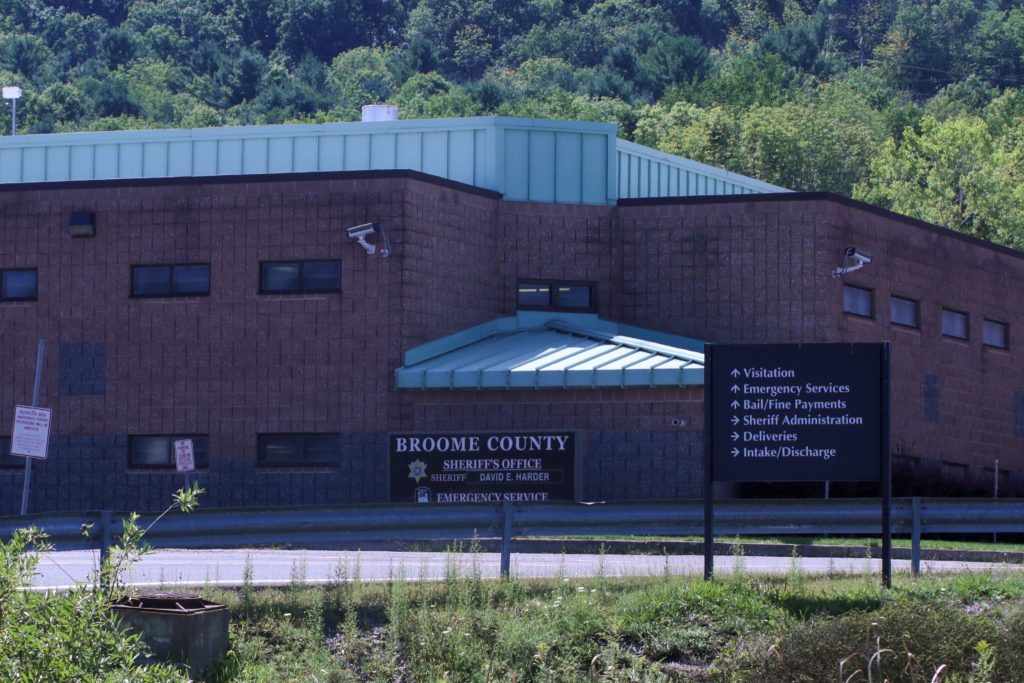After two years of prohibited contact between inmates and visitors, Broome County Jail must resume in-person visitation.
Last May, Justice and Unity for the Southern Tier (JUST), a nonprofit that advocates against mass incarceration, filed a lawsuit against David Harder, the sheriff of Broome County Jail, for prohibiting in-person visitation and overcharging for phone and video calls. According to legal documents, the jail allows inmates a weekly, free five-minute call, with payment required for each minute afterward. The class action suit was filed on May 11 by Joshua Cotter, an attorney at Legal Services of Central New York, on behalf of JUST, who pleaded to make the resumption of in-person visitation a legal requirement.
The deciding trial of the JUST and Megan Pond v. David Harder lawsuit was held at the Broome County Courthouse in early August. Judge Oliver N. Blaise III, a Supreme Court Justice of the Broome County Courthouse, granted the plaintiff’s motion to make in-person visitation a requirement at the Broome County Jail. Harder has until Sept. 5 to honor this decree.
According to Bill Martin, founding member of JUST and a Bartle professor of sociology at Binghamton University, the jail’s refusal to reopen in-person visitation caused the lawsuit.
“The lawsuit arose after [the] Delta [variant] when they opened everything up,” Martin said. “They opened up visitation in the state prison almost a year ago. It’s socially distanced and people wear masks, but there was no sign Broome County [Jail] was ever going to open up. It contravenes the state constitution for people awaiting trial.”
In-person visitation has been prohibited at the Broome County Jail since March 2020, around the time of the initial COVID-19 shutdown. At the time, the prison was required to make all communication between communities inside and outside the jail virtual for safety reasons.
Harder explained that COVID-19 caused the temporary visitation pause. Harder said the jail takes measures to regulate the spread of COVID-19, and the safety of the visitors, inmates and officers made this decision necessary.
“I look out for the safety of inmates and employees at this facility, which comes to about 500,” Harder said. “There are over 370 inmates and around 200 uniformed employees here. We had an outbreak of [COVID-19], and we took some steps to cure it. We’ve got it under control, and we’re trying to keep it that way, and [JUST] wants us to open it up, so [the inmates] can get [COVID-19] again.”
The expenses of contacting inmates were also mentioned in the lawsuit. In a blog post by Martin, he claims each additional minute after the five given minutes per call costs 25 cents, per week. These rates are about six times those at the state prison. According to Martin, jails across New York state have charged similar rates for phone and video calls, which are made from tablets in the cells.
“Most of the [New York state] jails have signed contracts with a private firm,” Martin said. “It’s three cents a minute in the state system, it’s 25 cents [at Broome County Jail], but that contract is fairly common and generates a $1 million. Given [COVID-19] and [that] people can’t visit, so there are people spending tens of dollars every day to talk to their mothers, fathers or even lawyers, so it’s been a profit maker as well.”
Jackson Hengsterman, a senior majoring in English, has paid the jail’s call and text fees. Hengsterman is the coordinator of JUST’s volunteer visitation program and documents every transaction between JUST and the jail.
“We are paying the full amount [to contact inmates], and that is for everybody from volunteers to me,” Hengsterman said. “We pay the full amount for calls and texts. That has not changed, and that will not change. In February, we spent $500.47. In March, we spent $192.88, April was $80.47 and May was $131.75.”
James Lynch, an inmate at the Broome County Jail, said his family cannot afford the costs of communication, and that the costly video calls have limited interaction between him and his 7-month-old son.
“Due to the expensive video visits they have in here, [which are] $7.50 for a half an hour, I have not been able to see my son because my kid’s mother doesn’t have the extra money for that,” Lynch wrote. “The lack of visits has put an enormous amount of unneeded stress on my relationships, which have actually played a part in the fallout with my son. I mean, he is only 7 months old, but without the chance to see him, like it is my right, he does not know who I am.”
Some view this matter as a perspective-building one. Gail Guay, a senior majoring in English, commented on how students at BU can bring more attention to community matters by educating themselves.
“I think the system over all of [New York state] needs work, and there are definitely so many things that go on every day that are unnoticed,” Guay said. “Being that we are students and that we are going to college and have the privilege to educate ourselves, we should use that for good and positivity, not to turn a blind eye just because it doesn’t affect us. We should make a conscious effort to make where we live, and where we go and overall make the country a better place.”



